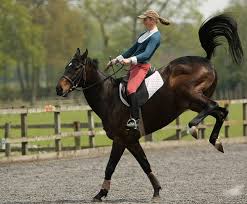Search the Site
Dr. Haefner's Blog post # 8: Strategies For Recovery

Recently a friend and trainer Lesley Stevenson posted a question on her Facebook page asking how people recover from a bad ride. I loved reading the responses. Sharing ideas and experiences with each other is an essential part in maintaining our resilience in the face of challenge. I also admired the wealth of knowledge, creativity and humor in everyone’s responses. As I read each comment, I started thinking about how the responses naturally fell into several categories which reflected the strategies for recovery recommended by sport psychology consultants. As a tribute to all the riders that responded to that post, I thought I would try to summarize those strategies here so we all might benefit.
First let me say that, while the initial question was about recovering from a bad ride, I would suggest that we might broaden it to include all disappointments, frustrations, irritations and bad experiences in general. Like so many other things in our horse experience, keeping the following strategies in mind will be helpful in our riding but also in our lives in general. With that in mind, here are 5 strategies for helping us recover from a “bad ride”:
Setting Realistic Expectations
There is a an old saying that if you don’t want to be disappointed, don’t have any expectations. While I don’t agree with the idea of giving up all expectations, I do think that disappointments and frustrations are an opportunity to check in on our expectations and make sure they are realistic. Consistently falling short in the face of unrealistic expectations is a tried and true recipe for misery and human suffering (not to mention equine suffering).
There are two things I try to consider when reflecting on expectations. The first is the expectation itself. I like to ask how the expectation was established. Is it solidly grounded in expert knowledge and experience? And, did I set this expectation or did I import or adopt someone else’s? These are particularly important questions to ask since unrealistic expectations are often grounded in incorrect or incomplete information. Problems are also likely if we are trying to live up to someone else’s expectations.
The second consideration is context. Even the most realistic of expectations can devolve into disaster in an unfavorable context. What I might reasonably expect on one day in one setting or set of conditions may be entirely unrealistic in a different place under different conditions. This is the spirit of the saying, “Ride the horse that shows up that day.” It also acknowledges that many things that are not in our control and that we should take this into account in realistically adjusting our expectations.
Curiosity, Reflection, Knowledge and Understanding
People regularly use several strategies for regulating their emotional experience. One of the most powerful is the acquisition of knowledge and understanding. Somehow, even when we can’t change something, understanding it makes us feel better. The search for knowledge and understanding is grounded in, and motivated by, an attitude of curiosity and it is accelerated by the process of reflection. Like expectations, knowledge and understanding are not necessarily realistic or valid. In many ways curiosity and reflection helps provide the foundation for a realistic and valid search for understanding. It is best when knowledge is valid, practical, effective, and connected to our experience in real and helpful ways.
Reframing
- Internal vs. External
- Global vs, Specific
- Stable vs. Unstable
The nature of the attributions we make about positive and negative events determine their helpfulness to us in moving forward. For example, if we see a negative event as my fault (internal) and we think it always happens (stable) in every situation (global) the attribution is likely to have a deleterious effect on us moving forward. We are often better served by more subtle or complex attributions for negative events that are a blend of internal and external causes (Internal and External), respect the event as happening in a specific context (Specific), and view it as changeable over time (Unstable).
The neat thing about our personal explanations for the causes of events is that they we can update or change them. Taking irrational or maladaptive thoughts and finding more positive alternatives for them is a psychological strategy known as reframing. This works well for negative thinking patterns in general. The next time your find yourself being harshly negative, take note of that thought and identify 3 more positive or adaptive alternatives. This process helps to break negative thinking cycles and also opens the door to curiosity and reflection that I referred to above.
Break States, Rest and Rejuvenation
One of the easiest and most under used strategies is the break state. In any experience there is a certain degree of psychological/emotional momentum. The idea is a simple one, do something unusual or silly to snap you out of your current state. At the end of a hypnosis session I will often ask my clients to slap their legs, stomp their feet, and say something unusual or unexpected like “hippopotamus.” These simple actions breaks the momentum of our state of being and allows us to start fresh.
Equally important, and under used, is the strategy of taking an actual break. The idea of a break is for it to be restorative. It can be restorative in terms of balance in our thinking, emotions, as well as our physiology. Breaks come in all shapes and sizes. Smaller breaks might serve a purpose similar to a break state exercise. Longer breaks, like taking a nap, a glass of wine or dinner with loved ones, or a weekend away, allow us to rejuvenate ourselves. Rejuvenation can and should be physical, emotional, energetic and spiritual. In our hard-driving world we have lost the art of rejuvenation which ultimately makes us less resilient and less adaptive.
Acceptance
First, let’s identify what acceptance is not. Acceptance is not settling, giving up, or setting aside your goals and dreams. Acceptance is instead an acknowledgement of what is happening without all the judgments. Acceptance is a very important skill to develop. Yes, I said a skill. The ability to focus on and acknowledge what is happening at any given moment with out latching on to a process of judgement and evaluation is a skill which can be learned, practiced, and developed. The amazing thing about acceptance is that it allows a space between an experience and our reactions, giving us the chance to make a choice. When we exercise choice in responding to a situation rather than reflexively reacting we create the opportunity for creativity, flexibility, adaptability, and ultimately change.
Putting It All Together
I think it is fair to say that “bad rides” are inevitable. We are all going to have a day when things don’t go our way. We will have days when we are not at our best, we will have days when our horses are not at their best, and we will have days when the our surroundings and circumstances work against us. When those rides come our way, we can carry with us a well stocked tool box of strategies and skills that will do more than carry us through. They will allow us to transform those experiences in opportunities for learning and growth, moving us closer to our riding goals.






